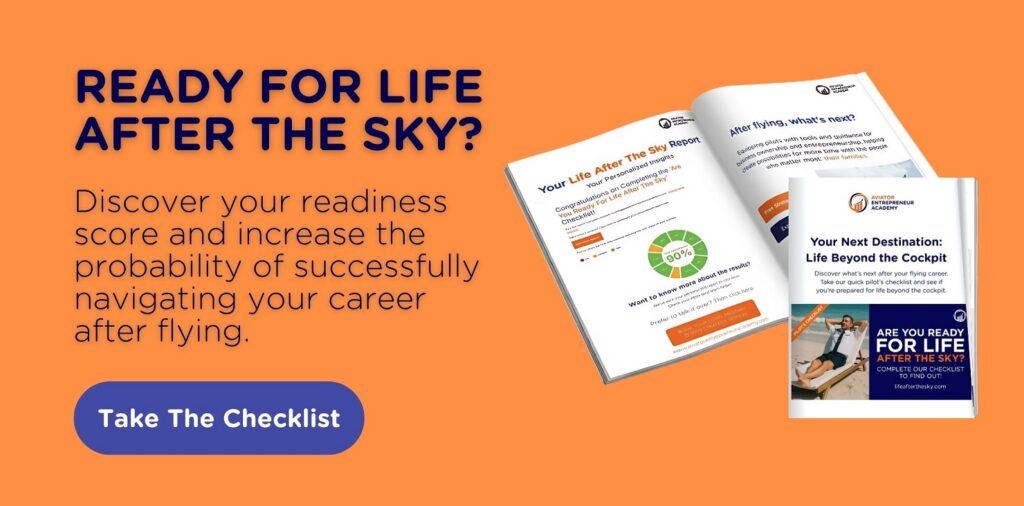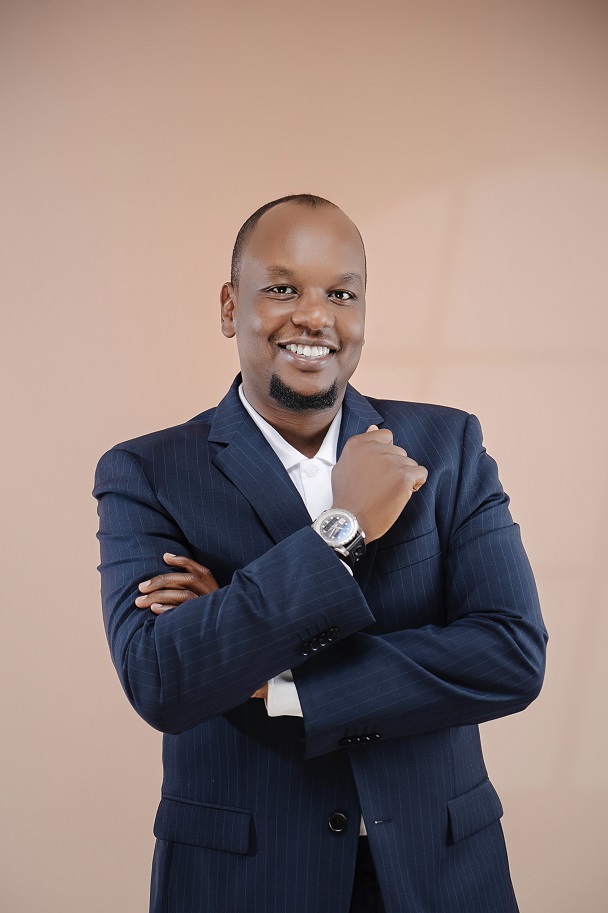As a pilot, you already know how important altitude is. Too low, and you hit obstacles; too high, and risk oxygen deprivation.
But in life after aviation, there’s another altitude that matters even more, and that’s your mental altitude.
Most pilots stick to “cruise thinking,” aiming only for what feels safe and reasonable. The truth is, playing it safe is what keeps you stuck. Your biggest barrier isn’t skills or money, it’s the limits you’ve set in your own head.
Raise that ceiling, and suddenly what felt impossible becomes achievable.
Key Takeaways
- Big Thinking Is About Altitude: You don’t need 10x more energy to achieve 10x more results. All you need to do is raise your mental ceiling.
- Aviation Habits Keep You Safe: Conservative risk-taking, seniority-based pay, and a “permission-first” mindset limit wealth potential outside of flying.
- Vision Attracts People: Small goals bring cautious peers. Big goals bring ambitious partners, mentors, and investors.
- A Multiplication Mindset Beats Side-Business Thinking: Don’t just trade time for money. Find ways to multiply value, impact, income, and reach.

What Is the Big Thinking Framework?
The Big Thinking Framework is a way for commercial pilots to shift from “cruise altitude” thinking to “high altitude” thinking in business and life.
In simple words, it’s about upgrading the size of your goals without upgrading the effort. You don’t need 10 times more energy to achieve 10 times bigger results; you just need to think at a higher level.
For pilots, this means breaking away from mindset myths such as conservative risk-taking, waiting for permission, or limiting oneself to aviation-related opportunities. Instead, it’s about asking bigger questions and using your aviation strengths.
Why Pilots Default to Small Thinking
You know how we don’t fly without a flight plan, checklist, or backup systems because safety comes first. But those very mental habits that keep us safe in the sky often hold us back on the ground.
When it comes to business and wealth, many pilots settle for what feels steady, safe, or “doable” instead of what could be a breakthrough.
“If the mind is blind to the possibility, the eyes can’t see the opportunity ~ Dr Myron Golden
How Do You Shift from a Small to a Big Thinking Mindset?
If you want to shift from small to big thinking, you need to change the altitude of your mindset. Just like flying makes the journey smoother and faster, thinking bigger unlocks opportunities that simply don’t exist at “low altitude” thinking.
Here’s how you can do it:
1. Opportunity Recognition
When you start thinking bigger, opportunities that were previously invisible become apparent. It’s like raising your cruising altitude and suddenly, you see more of the map. A Stanford study found that people with a growth mindset are more likely to take entrepreneurial action. That’s because they aren’t looking for limitations, they’re looking for possibilities.
2. Network Attraction
People are drawn to vision. When you think small, you attract cautious, small-minded peers. However, when you think big, you naturally attract ambitious people, mentors, and investors who want to build at scale.
A Forbes report showed that 80% of companies believe a growth mindset directly drives profits. It proves that bigger thinking attracts resources.
3. Resource Utilization
Big thinkers don’t stop at “I can’t.” They ask, “How can I?” That shift mobilizes resources, such as capital, time, and people, that small thinkers never touch.
Small, consistent wins compound into major results. Business research also confirms that tiny 1% daily improvements compound into exponential growth over time.
4. Innovation Acceleration
Operating at low altitude makes you safe, but it also keeps you slow. Big thinking pushes you to innovate, to test new approaches, and expand into untapped markets.
That doesn’t just create growth, it creates breakthroughs. Most disruptive businesses today didn’t start with better processes; they began with bigger questions.
How Can Pilots Break Through Common Mental Limitations?
Every pilot has heard the same excuses play in their head: “I don’t have business experience. I don’t know the right people. I don’t have the capital.”
But here’s the truth: those limitations are only valid if you let them be. With the right mindset, they can actually become your biggest strengths.
If you think having no business experience is a disadvantage, it’s because you’re not weighed down by outdated corporate thinking. You bring fresh eyes, discipline, and systems that most entrepreneurs wish they had.
Action for You: Take on the limitation you’ve been holding on to, flip it, and write down how it could be to your advantage. Keep it visible in your workspace. This is your daily reminder that excuses are raw material for strengths.
What’s the Mindset Shift That Multiplies Everything?
Too many pilots think in “side business” mode, but the multiplication mindset is what separates hobby income from true wealth. It’s not about working more hours; it’s about multiplying the impact of every hour, every dollar, and every connection.
You can think of it this way: when you add value, don’t just do it once.
Here is how multiplication mindset can help you think in the right direction:
1. Value Multiplication
Instead of sharing your expertise with a handful of people, ask: How can I serve thousands instead of dozens? For instance, you could turn your aviation knowledge into online courses, consulting packages, or tools that reach people worldwide.
2. Impact Multiplication
Your aviation strengths aren’t limited to flying. Ask: How can my aviation expertise solve problems for entire industries? You can go towards logistics, safety systems, or leadership training.
3. Income Multiplication
Hourly pay locks your income to your availability. Multiplication asks: How can I create systems that generate revenue without direct time investment? That could mean building a subscription product or setting up businesses that run without you.
4. Geographic Multiplication
Most people are tied to one market, but pilots already think globally. For this one ask yourself: How can I serve global markets instead of just local ones? Because of your aviation reach, you can test opportunities across corners.
5. Time Multiplication
Flying proves how valuable your time is. The question is: How can I create assets that work while I’m sleeping or flying? Software, automated systems, or even teams you build can generate results without needing your constant input.
Ready to Stop Thinking Small?
Shifting into big thinking doesn’t happen by accident. It happens when you decide to start seeing yourself as more than a pilot.
If you’re not sure how to make that shift, don’t worry. You don’t have to figure it out alone. In just 3 minutes, you can complete our Life After The Sky Checklist. It’s a simple guide that shows you exactly what steps to take to unlock the opportunities waiting for you.
Your altitude in life is not fixed. It’s time to climb higher.
Invitation to Join Our FREE Strategy Session
Most pilots are one honest conversation away from clarity. This is that conversation.
Complete our “Life After the Sky” checklist, then join me for a FREE 15-minute “Strategy Session” via Zoom.
This session has been created for pilots who want to take ownership of what comes next.
Those who want action, not just to talk about it.
In just 15 minutes, we’ll:
- Review your checklist results
- Identify the one obstacle holding back your reinvention
- Translate your checklist results into a clear starting point
Start your pre-flight assessment for the next chapter of your journey by Booking your free strategy session here!



